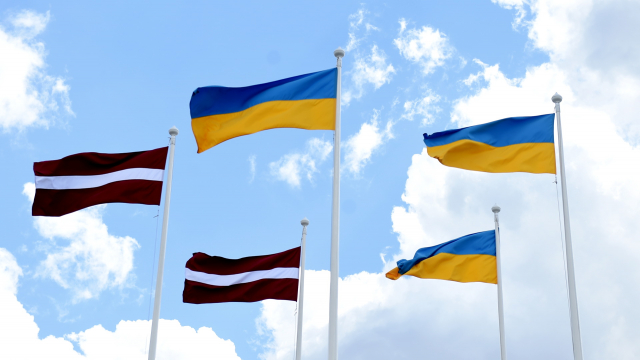On May 9 each year, thousands of people come to lay flowers at the monument in Victory Park. But the event has become much more than just a memorial. It is a great opportunity for the pro-Russian political forces to fish for supporters. It is also a feast without regard that the end of World War II did not mean any liberation for Latvia and was followed by nearly half a century of Soviet occupation.
The celebration became more grandiose with Nils Ušakovs (Harmony) becoming mayor of Riga. May 9 is also an opportunity for the Kremlin to spread its symbols and messages to the Russian community. For example, pro-Russian activists arrived at the monument on May 9 after the annexation of Crimea under the flag of the self-proclaimed People's Republic of Donetsk.
For these and other reasons, there have been numerous discussions on the dismantling of the Soviet symbol. The initiative was launched in 2017 by Uģis Polis who was not linked to any political force at the time but is now a member of the National Alliance.
“For Latvian society, this is a very painful topic. It is painful to see the Victory monument from the point of view that it is associated with the repression that followed the invasion of Soviet troops,” says the author of the initiative.
In 2019, the Saeima received an application with 10,000 signatures on the dismantling of the monument, but there was no follow-up. Its review has now resumed following Russia's invasion of Ukraine.
The initiative about dismantling the monument is stopped by lawyers every time. The monument shall not be demolished due to an agreement concluded between Russia and Latvia on the social protection of Russian military pensioners. It was signed in Moscow in April 1994 in conjunction with other agreements.
Article 13 of the agreement signed in Moscow provides that Latvia shall ensure the maintenance, improvement and preservation of memorial buildings and soldiers' mass burial sites. There are no such obligations for Lithuania and Estonia. The document does not mention the monument in question. However, following a failed bombing of it in 1997 by a national extremist group, Russia and Latvia signed other agreements which are not made public. The implementation of the Agreement is monitored by the Organization for Security and Co-operation in Europe (OSCE).
“Understanding the situation with the Russian aggression against Ukraine, it would be advisable to seek solutions that do not threaten the fulfillment of Latvia's international obligations,” Atis Lots, deputy State Secretary of the Ministry of Foreign Affairs, said during the meeting of the Saeima Foreign Affairs Commission the dismantling of the monument.
The deputies of the commission have asked the Ministry of Justice to offer solutions for the demolition of the monument. Justice Minister Jānis Bordāns told LTV that at least three scenarios are being prepared.
“I have the feeling that this support [for demolition] is there and that colleagues want to do it, only until now there has been a caution, a fear of the unknown. What I can say to the Ministry of Foreign Affairs: it will be on their shoulders to a large extent, and in such cases, you can probably choose to take risks, try, make an effort, or not. But the Justice Department is prepared to help with finding solutions,” Bordāns said.
In an interview with LTV last week, European Court of Justice Judge Ineta Ziemele came forward with a view that international commitments could be viewed differently in the context of war: “Since this monument is clearly for the Soviet army, and the Russian Federation army, which is currently attacking and killing civilians in Ukraine, is actually the heiress of the Soviet army, this monument represents the aggressor.”
However, the question of dismantling the monument is not just of legal nature. Member of the Foreign Affairs Commission Krista Baumane (Development/For!) drew attention to the fact that manipulation around the monument would intensify tensions in society. Researcher Mārtiņš Kaprāns also said this should be taken into account.
“[People] think we will now demolish the monument and the symbol will disappear. The symbol is already in the head, the symbol is not the stone block that stands there. [Demolition] does not in any way solve the problem that Latvia has different social memories, that Latvia has different historical ideas, but the practical consequences are much more far-reaching for our ethnic relations here in Latvia,” said Kaprāns.
The Justice Ministry must offer its solutions by April 15.
Although the fate of the monument has not yet been decided, it is clear that May 9 this year, there will be no such celebration as usual. The Saeima has banned public events on May 9, as well as the organizing of events within 200 meters of the Soviet Army monuments.


























